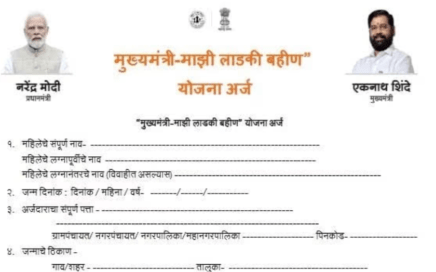Nagpur: The Maharashtra State Government recently launched the ‘Mukhyamantri Majhi Laadki Bahin Yojana,’ a welfare scheme aimed at providing financial support to women in the state. Women in the age group of 21 to 60 years are eligible for this scheme, which offers a monthly benefit of Rs 1,500. The scheme officially began on July 1, 2024. A significant number of women have been visiting the ‘Setu Suvidha Kendras’ across Maharashtra to apply for the benefits of this new scheme.
However, a controversy has emerged regarding the application forms for the scheme. These forms prominently display images of Prime Minister Narendra Modi, Chief Minister Eknath Shinde, and Deputy Chief Ministers Devendra Fadnavis and Ajit Pawar.

Opposition parties in Maharashtra have criticized the display of these political leaders’ images on the application forms. They have accused the State Government of using the scheme as a means of cheap publicity ahead of the upcoming Assembly polls. The opposition argues that the inclusion of these images is a strategic move to gain political mileage rather than focusing on the welfare of the women in the State.
In addition to the controversy, the government has also made changes to the eligibility criteria for the scheme. Initially, a domicile certificate was required to qualify. However, to make the scheme more accessible, the government has now allowed alternative documents such as a ration card, voter identity card, school leaving certificate, or birth certificate to be used in place of a domicile certificate.
The ‘Mukhyamantri Majhi Laadki Bahin Yojana’ has sparked a political debate in Maharashtra. While the scheme aims to provide financial assistance to women, the controversy surrounding the application forms’ images and the timing of its launch has led to accusations of political manoeuvring. The changes in eligibility criteria have been made to ensure more women can benefit from the scheme, but the political implications continue to dominate the discourse.













